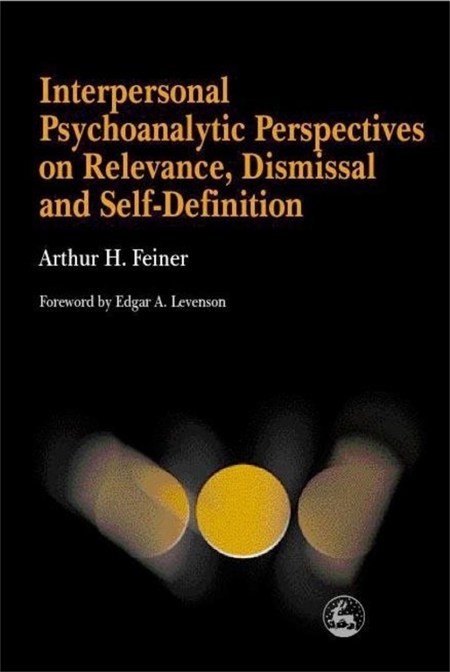Most books on psychoanalysis, its theory or its process, are packed with abstract, esoteric lingo that’s fars away from how people feel or express themselves. This one is different in that it’s of the “she-Isaid” variety, and at the same time presents a pot full of insight about patients that really rings true. Dr. Levenson, in a truly lucid foreword, pegs dr. Feiner just right – a rare combination of the shades of Isaiah Berlin and Zorba the Greek. The book is erudite, scholarly and quite articulate and downright humorous, at times, all in the service of trying to capture precisely what goes on in interpersonal psychoanalysis, and how people might change. It is an area of psychotherapy that isn’t written about usually. But the high point of this profound book is to demonstrate how authentic psychoanalysis is clearly non-adversarial and non-advice giving, but genuine analyses of the patient, the analyst himself, and their interaction.
The themes of relevance and dismissal are central to our relations with other people and, therefore, to our concept of our identity. These themes of relevance and dismissal pervade Arthur Feiner’s exploration of the core ideas of interpersonal psychoanalysis and his use of them in his clinical practice. This particular branch of psychoanalysis, developed by Sullivan, Fromm, Fromm-Reichmann and Thompson, shifts the focus from explaining experience to describing it, with an emphasis on therapeutic interaction.
Our identity, or self-definition, is at least partially constructed from early relationships. The impact of the analyst’s words and behaviour on the patient is crucial. Feiner considers the therapeutic relationship both from the patient’s perspective – vengeful responses to dismissal, restlessness and the experience of hope – and from the analyst’s – deliberate `misreading’ as a form of intervention, the usefulness of errors, and the contradictions and difficulties inherent in supervising – taking an interpersonal psychoanalytic approach. Throughout he returns to his central themes, reiterating that the rage, anxiety and depression experienced by patients are expressions of the feeling of having been dismissed, of being no longer relevant.
The themes of relevance and dismissal are central to our relations with other people and, therefore, to our concept of our identity. These themes of relevance and dismissal pervade Arthur Feiner’s exploration of the core ideas of interpersonal psychoanalysis and his use of them in his clinical practice. This particular branch of psychoanalysis, developed by Sullivan, Fromm, Fromm-Reichmann and Thompson, shifts the focus from explaining experience to describing it, with an emphasis on therapeutic interaction.
Our identity, or self-definition, is at least partially constructed from early relationships. The impact of the analyst’s words and behaviour on the patient is crucial. Feiner considers the therapeutic relationship both from the patient’s perspective – vengeful responses to dismissal, restlessness and the experience of hope – and from the analyst’s – deliberate `misreading’ as a form of intervention, the usefulness of errors, and the contradictions and difficulties inherent in supervising – taking an interpersonal psychoanalytic approach. Throughout he returns to his central themes, reiterating that the rage, anxiety and depression experienced by patients are expressions of the feeling of having been dismissed, of being no longer relevant.
Newsletter Signup
By clicking ‘Sign Up,’ I acknowledge that I have read and agree to Hachette Book Group’s Privacy Policy and Terms of Use
Reviews
Interpersonal Psychoanalytic Perspectives on Relevance, Dismissal and Self-Definition is a collection of eight papers by Arthur Feiner, all but one of which have appeared previously in issues of Contemporary Psychoanalysis. Writtenduring the 1990's, these papers represent a culmination of many years of clinical experience and scholerly involvement in the field of psychoanalysis, particularly from within the interpersonal tradition. In reading this book, one has the experience of driving on a winding mountainous road, stopping every now and then in response to a sign that says 'scenic view,' and being enthralled by the scope and clarity afforded by that particular vantage point. With each stop one is enthused to drive even further and higher.
From the title, this book doesn't sound like an easy or appealing read but don't be put off. This is a collection of papers in which, through exploration of his own case studies, Feiner reflects on his clinical practice as a psychoanalyst. But this is no thinly disguised self-promotion. Rather, Feiner explores the mistakes and mis-readings he has made and how, paradoxically, they can be therapeutically powerful in bringing into focus the experiences of irrelevance and dismissal that patients bring to the therapeutic relationship.
Feiner's style is lucid and he wears his considerable knowledge and experience lightly. Knowledge of the concepts of psychoanalytic psycotherapy is assumed but reassurance for the novice is immediatley available in the title of the first chapter: 'Bewitched, Bothered and Bewildered - Some Core Issues'. Here Feiner explains with great clarity the inter-personal approach, how it differs from traditional analytic approaches and what it has to offer. He explores vengence and vindictiveness, loss and rage and there is an iconoclastic chapter about the role of touch and hope.
Feiner combines playfulness with a deep commitment to the importance of the process of shared enquiry by analyst and patient into the latter's experience of the patient. A remarkable and inspiring book.
Arthur Feiner has provided us with a personal account of his nearly 50 years of psychoanalytic practice. His style is relaxed and conversational as if chatting across a table. He liberally sprinkles his discourse with lively examples and metaphors from religion, physics, politics, biology, poetry and other fields. In general , this is a delightful, erudite, subtly scholarly, but intensively visceral review of the professional life of a seasoned editor, author, interpersonal analyst and mensch.
